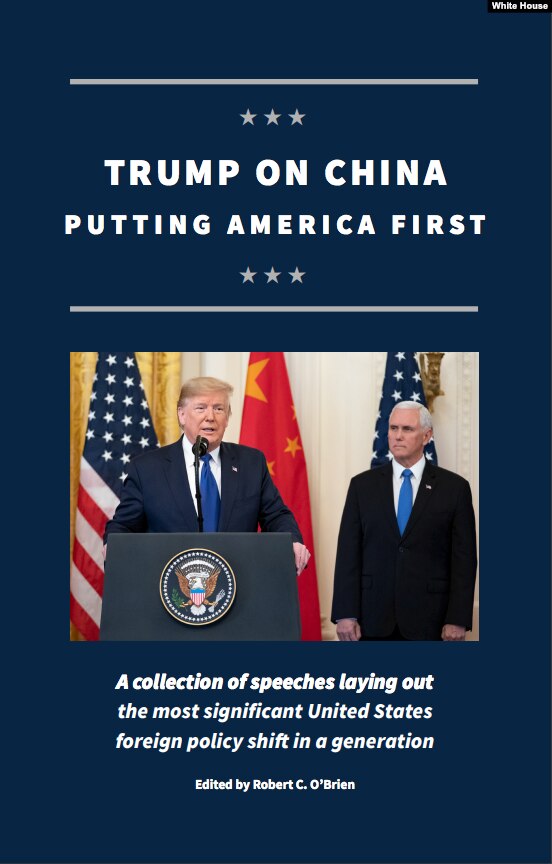Trump
on China: Putting America First
1. 川普似乎信心滿滿?或者
2. 有價值信仰的人,要留下歷史的legacy?
Kennan's
Long Telegram 肯楠的長電報 翻譯:Taimocracy
喬治肯楠:蘇聯行為的根源(翻譯:Taimocracy)--1/4
喬治肯楠:蘇聯行為的根源(翻譯:Taimocracy)--2/4
喬治肯楠:蘇聯行為的根源(翻譯:Taimocracy)--3/4
喬治肯楠:蘇聯行為的根源(翻譯:Taimocracy)--4/4
《川普論中國》:白宮發表美高官中國政策演講文集 VOA 20201103
白宮星期一(11月2日)發表了題為《川普論中國》的文集,匯集了川普總統和一些最高級官員有關中國事務講話,展示川普政府做出了白宮所說的“美國一代人以來最重大的外交政策轉變”。
美國國家安全委員會在星期一的聲明中說,美國不再對中華人民共和國的行為視而不見,也“沒有把我們對中國共產黨的批評關起門來藏在後面”,這些演講是川普政府“保護美國人民所做努力的一個關鍵組成部分”。聲明還說,這些演講綜合起來類似於力主對蘇聯採取遏制政策的美國外交官凱南1946年從莫斯科發回的“長電報”。
在美國大選日的前一天,白宮國家安全委員會把川普總統以及政府最高級官員有關中國事務的講話結集成書進行發表,用這些演講來表明,面對日益咄咄逼人的北京,川普總統採取了行動,保護美國及其盟友不受中國的威脅。
在這次的大選中,川普總統把對中國強硬作為其外交政策的一個主題。
這部題為《川普論中國:把美國置於首位》(Trump on
China: Putting America First)的文集由國家安全顧問羅伯特·奧布萊恩編輯。
國安會在一份聲明中說,“收錄在本書中的演講,從副總統彭斯於2018年10月發表的開創性的講話開始,以川普總統在聯合國大會第75屆會議上呼籲採取行動為結尾,是本屆政府保護美國人民所做努力的關鍵組成部分。”
聲明說,美國不再對中華人民共和國的行為視而不見,也“沒有把我們對中國共產黨的批評關起來門來藏在後面”,而“在此之前,美國高級官員從未以如此坦率和一貫的態度公開談論中國對美國構成的挑戰”。
除了彭斯在哈德遜研究所發表的對華政策演講以及川普總統有關中國的講話以外,這本書還收錄了奧布萊恩、聯邦調查局長克里斯托弗·雷、司法部長威廉·巴爾和國務卿麥克·蓬佩奧今年夏天在美國各地發表的一系列演講,也收錄了副國安顧問博明用中文發表的有關中國“五·四”精神的演講。
國安會表示,這些演講實現了幾個重要的目標:
一是教育美國公民中國共產黨“對他們的生計、商業、自由和價值觀構成的威脅”;
二是提醒美國的盟友和夥伴,“讓他們也為自己的人民挺身而出,為我們的共同利益和價值觀挺身而出”;
三是“對抗處於中國共產黨全球戰略核心的宣傳機器”。
聲明說:“我們面臨的競爭不是中國對美國。這是帶著馬克思-列寧主義和重商主義世界觀的中國共產黨對全世界、對各地熱愛自由的人民。”
聲明說:“這些高層講話是為了抗擊處在中國共產黨全球戰略核心的宣傳機器。川普總統明白,美國早就應該反擊中國散佈的所謂其威權模式強項的訊息了。”
聲明還說,“川普總統在今年5月的講話中明確表示,'美國希望與中國有開放與建設性的關係,但是實現這種關係需要我們大力捍衛我們的國家利益。'這本書解釋了川普總統呼籲在面對中國時大力捍衛美國國家利益的含義。”
聲明認為,這些演講綜合起來,類似於1946年美國外交官喬治·凱南(George Kennan)給美國國務院發回的概述他對蘇聯看法的“長電報”( Long Telegram )。凱南的這些長電報成為美國對蘇聯採取遏制政策的基礎。
不過國安會的聲明提到,這本書在兩個重要方面不同於凱南的“長電報”。聲明說,首先,“長電報”只是出自一位駐外使節之手,而這本書包含了總統和他的最高級官員的言論和政策;其次,鑑於中國的人口規模、經濟實力和歷史性的全球雄心,中華人民共和國是一個比鼎盛時期的蘇聯更有實力的競爭對手。
President
Trump on China: Putting America First the
White House 20201102
For decades, Donald J. Trump was one of the few prominent Americans to
recognize the true nature of the Chinese Communist Party and its threat to
America’s economic and political way of life. Now, under President Trump’s
leadership, the United States is taking action to protect our nation and its
partners from an increasingly assertive China. We are no longer turning a blind
eye to the People’s Republic of China’s conduct nor are we hiding our criticism
of its Communist Party behind closed doors.
The
speeches included in this book, starting with Vice President Mike Pence’s
groundbreaking remarks on October 2018 and ending with President Trump’s call
to action at the 75th session of the United Nations General Assembly, are a key
component of the Administration’s effort to protect the American people.
Until now, senior American officials had never spoken publicly with such
candor and consistency about the challenge posed by China to our nation.
Earlier this year, President Trump asked four of his most senior national security
officials, Robert C. O’Brien, Christopher Wray, William Barr, and Michael
Pompeo, to explain current U.S. policy on China to the American people. Over
the summer of 2020, they did so in a series of speeches delivered around the
country.
Collectively, the remarks contained in this book achieve several important
objectives. They educate our citizens about the threat posed by the Chinese
Communist Party to their livelihoods, businesses, freedoms, and values.
These speeches also alert our allies and partners so that they, too,
should stand up for their own people, and for our mutual interests and values.
The competition with which we are faced is not China versus the United States.
It is the Chinese Communist Party, with its Marxist- Leninist and mercantilist
vision for the world, versus freedom-loving people everywhere.
These high-level speeches serve to combat the propaganda machine at the
heart of the Chinese Communist Party’s global strategy. President Trump
understands that it is past time for America to counter China’s messaging about
the supposed strengths of its authoritarian model.
In his 2018 address to the Hudson Institute, Vice President Pence
discussed the whole-of-government approach that the Chinese Communist Party is
employing to advance its influence in the United States, using political,
economic, military, and propaganda tools.
Following Vice President Pence’s address, Deputy National Security
Advisor Matthew Pottinger spoke to a worldwide Chinese audience about the
populist democracy movement that began a century ago in Beijing and is the
proud heritage of the Chinese people. He demonstrated that Chinese history
contains another path for China’s people.
Next, Ambassador O’Brien explained the ideology and global ambitions of
the Chinese Communist Party to a business forum in Phoenix, Arizona. Many in
the West, especially in the business community, are not aware that China today
is one of the last few Marxist-Leninist nations on earth.
FBI Director Wray followed with an exposé of the pervasiveness of the
People’s Republic of China’s espionage and intellectual property theft from our
government, our companies, and our partners. He noted that such theft
constitutes one of the greatest wealth transfers in human history.
Attorney General Barr, for his part, warned the American business
community of its obligation to protect our national security notwithstanding
the blandishments of the Party and the lure of the Chinese market.
Secretary Pompeo concluded the series by outlining what has become the
most significant shift in U.S. foreign policy in a generation. America’s
diplomats and policy makers, he explains are rising to China’s
once-in-a-generation challenge and confronting the threat across the entire
diplomatic spectrum.
President Trump’s two speeches, from May and September 2020, hold the
Chinese Communist Party accountable for the Covid-19 pandemic. The President
made clear that Beijing’s blunders no longer affect only the Chinese people, as
they did under Mao Zedong. They impact the entire world. President Trump points
out that beyond the Covid-19 pandemic, China’s environmental devastation in the
Pacific and illegal over-fishing in every ocean are but two examples of how
China treats the rest of the world.
On the occasion of China’s ending of the “one country, two systems”
construct that had guaranteed Hong Kong’s freedom until 2047, the President
announced a range of significant penalties, noting the “plain facts [of what
China did] cannot be overlooked or swept aside.”
President Trump made plain in his May speech, “The United States wants an
open and constructive relationship with China, but achieving that relationship
requires us to vigorously defend our national interests.” This book explains
what President Trump means by his call for a vigorous defense of our national
interests vis a vis China.
The Chinese Communist Party prefers not to have the information and
messages contained in this book shared. It does not want people around the
world to know what the Party really believes, is doing, and is planning.
Taken together, the speeches herein are similar to U.S. diplomat George
Kennan’s 1946 “Long Telegram” to the State Department that outlined his views
on the Soviet Union. This book is different from the “Long Telegram” in two
important respects. First, unlike Kennan’s case, written by an envoy at post,
this book contains the words and policies of the President and his most senior
officials. Second, given China’s population size, economic prowess, and
historic global ambitions, the People’s Republic of China is a more capable
competitor than the Soviet Union at its height.

沒有留言:
張貼留言
請網友務必留下一致且可辨識的稱謂
顧及閱讀舒適性,段與段間請空一行